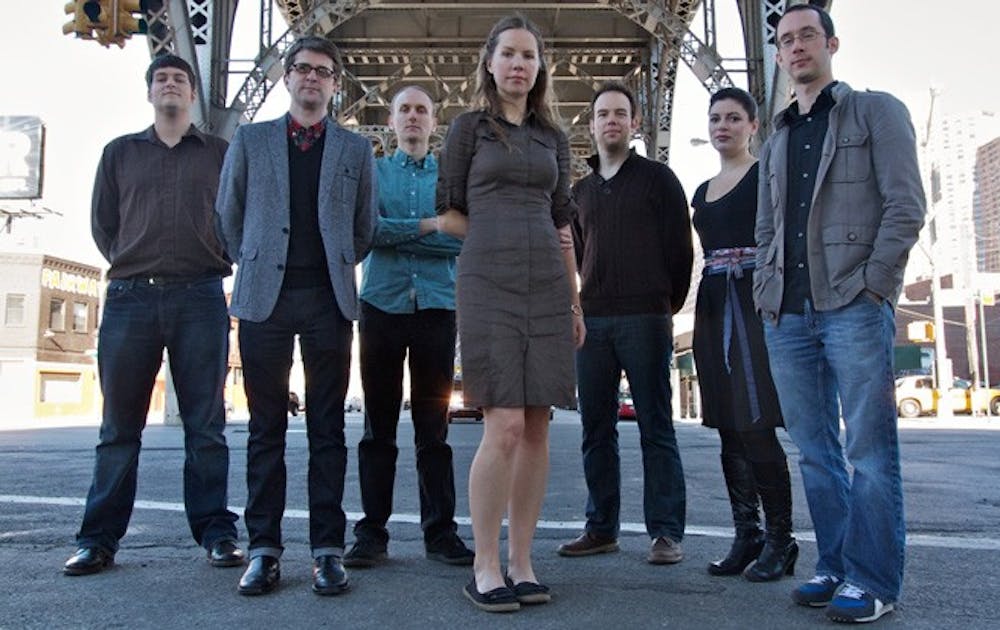After only a few minutes talking with each of this year’s PhD candidates in music composition, it’s clear that each takes a very different approach to the creation of classical music. Tim Hambourger makes musical miniatures: short movements he tightens until his language is both succinct and distinct. His work Last Wave Reached summons many of the adjectives used to describe the poet Kay Ryan, whose compact, intricate poems are woven throughout Hambourger’s composition. Dan Ruccia’s song cycle, which incorporates poems by Canadian sound poet Christian Bök, operates on a much larger scale than Hambourger’s. At times Ruccia describes the post-Philip Glass and post-Steve Reich sound world of Hallmarks, Sigils & Colophons as “gigantic” and “overpowering,” the size of which Ruccia believes was a necessary response to Bök’s “monolithic” text. And then there’s Paul Swartzel, whose concerto Barbecue Man, Unleashed: The Greatest Professional Wrestling Work of All Time takes inspiration from the entrance music of WWE wrestlers.
At 8 p.m. this Sunday in Sheafer Lab Theater, the three PhD candidates will premiere these compositions in A Concert of Dissertations, part of the Music Department’s Encounters series. Members of the New York-based Wet Ink Ensemble and the North Carolina Symphony as well as Anonymous 4’s Jacqueline Horner-Kwiatek and other guests will collaborate to perform the arrangements of both Hambourger and Ruccia. Swartzel’s concerto, to be played between Hambourger’s and Ruccia’s, has been produced using a virtual orchestra of over 1000 instruments. The concerto will serve as the musical accompaniment to a photo slideshow that narrates the story of protagonist Barbecue Man.
Even among the professors of the Duke Music Department, there’s no one preferred composition style, and all three composers have mentioned how Duke has allowed the PhD candidates substantial freedom to express and integrate their various musical interests. Hambourger’s experience with both sacred harp singing and Balkan singing helped to shape his vocal arrangements, and two of his composition’s movements are interspersed with instrumental imitations of bird songs. Ruccia’s composition incorporates influences as wide-ranging as free jazz, bossa nova, rock, doom metal and minimalism. Swartzel’s piece branches even further outside what is typically considered classical music. “[Swartzel’s concerto] is a mashup of professional wrestling, classical music, southern pop tropes and Hollywood,” said Professor Stephen Jaffe, Mary and James H. Semans Professor of Music Composition. “And he does it expertly.”
Swartzel has long been interested in the combination of classical music and wrestling. As a child he used to imitate the voices of wrestlers while playing classical records. He often associates classical music with feelings of strength, and at his high school graduation Swartzel said that hearing “Pomp and Circumstance” made him feel like “a macho man.” Barbecue Man, Unleashed brings together two of Swartzel’s great loves in a way that perfectly aligns with his approach to music. “I want to be a gateway drug to the classical music world,” Swartzel said. “I know that I’ll never be Bach. I’m not good enough. But I want to compose works that will bring people into the classical music world.”
Classical music composition has changed over the past few decades such that interdisciplinary pieces to be performed on Sunday are not as radical as they might have been forty years ago. There is much less stratification between genres, and not everyone is easily boxed into the typical categories of pure jazz training or pure classical training. This new plurality puts extra emphasis on the individual composer to synthesize musical strains without sacrificing emotional clarity. Jaffe, who serves as the chair of the dissertation committee for both Swartzel and Ruccia, said that it is very important for the contemporary composer to express depth of feeling and depth of reach and not merely “mash things together.” Jaffe believes that all three composers have risen to that task: “They’ve all shown a real interest and depth about synthesis and that’s very impressive.”
Given the composers’ various styles, it’s not obvious what conversations will arise between the compositions over the course of Sunday’s concert. Ruccia, however, did not seem too worried that the various pieces may not necessarily match. “I think it’s important to really bring the wide range of different sounds and possibilities of new music together under the same umbrella,” he said. “It seems a shame to me to let the different threads keep going on in their separate worlds. It’s much more interesting to find those places of commonality—that dialogue.” Likewise, there are joys to be found from hearing the places where compositions fail to converse, and the concert may offer a cross-section of potentially incompatible yet mutually viable approaches to contemporary music.
Perhaps most importantly for Duke undergraduates, A Concert of Dissertations provides an opportunity to listen to new, youthful ways in which classical music is being brought into contact with other potentially more accessible genres. Ruccia emphasized that any students interested in coming should not feel like it’s a standard classical concert nor should they worry if they know little about classical music. “The music might be challenging,” Ruccia said. “But that’s okay and shouldn’t be off-putting. Music is music and should be able to speak to you on a basic level without having to know all that much beforehand.”
A Concert of Dissertations will be performed this Sunday, Mar. 3, at 8 p.m. in Sheafer Lab Theater. The concert will be streamed online via the Music Department’s Ustream here.
Get The Chronicle straight to your inbox
Signup for our weekly newsletter. Cancel at any time.

